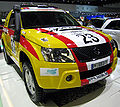2007 Suzuki Grand Vitara Owner's Manual - Page 131
2007 Suzuki Grand Vitara Manual
Page 131 highlights
VEHICLE LOADING AND TOWING Trailer Towing You can use your SUZUKI to tow a trailer, but you should always observe the requirements and recommendations in this section. If you intend to tow a trailer, it is essential to select a trailer and trailer towing equipment which are compatible. A reputable trailer dealer can help you. cool down. Refer to "If the Engine Overheats" section for details on how to deal with overheating. WARNING Never attach safety chains to the bumper of your vehicle. Secure connections so that they can't come loose. CAUTION Towing in "D" range up a steep hill can cause coolant overheating which may result in engine/automatic transmission damage. Trailer Lights Make sure your trailer is equipped with lights which meet federal, state and local requirements. Always check for the proper operation of all trailer lights before you start to tow. CAUTION Trailer towing puts additional stress on the engine, drive train and brakes of your vehicle. Never tow a trailer during the first 960 km (600 miles) of vehicle operation. Hitches Use only a trailer hitch bracket that is designed to bolt to the frame of your vehicle, and a hitch that is designed to bolt to this bracket. We recommend that you use a genuine SUZUKI trailer hitch bracket and trailer hitch (available as options), or equivalent. WARNING Never splice trailer lights directly into your vehicle's electrical system, or electrical system damage may occur. CAUTION Because towing a trailer puts additional stress on your vehicle, more frequent maintenance will be required than under normal driving conditions. Follow the schedule for Maintenance Recommended Under Severe Driving Conditions or perform more frequent maintenance as necessary. For Automatic transmission vehicles, shift into "3" (Low 2) or "L" (Low 1) (if necessary) and frequently monitor the coolant temperature gauge when towing up a steep hill. If the gauge indicates overheating, park the vehicle in a safe place and let the engine WARNING Never use a bumper hitch or a hitch which attaches to the axle of your vehicle. Brakes WARNING If trailer brakes are used, you should follow all instructions provided by the manufacturer. Never tap into the brake system of your vehicle. Safety Chains Always attach safety chains between your vehicle and trailer. Cross safety chains under the tongue of the trailer so that the tongue will not drop to the road if the trailer becomes separated from the hitch. Follow the manufacturer's recommendation for attaching safety chains. Always leave just enough slack to permit full turning. Never allow safety chains to drag on the road. 8-2
















